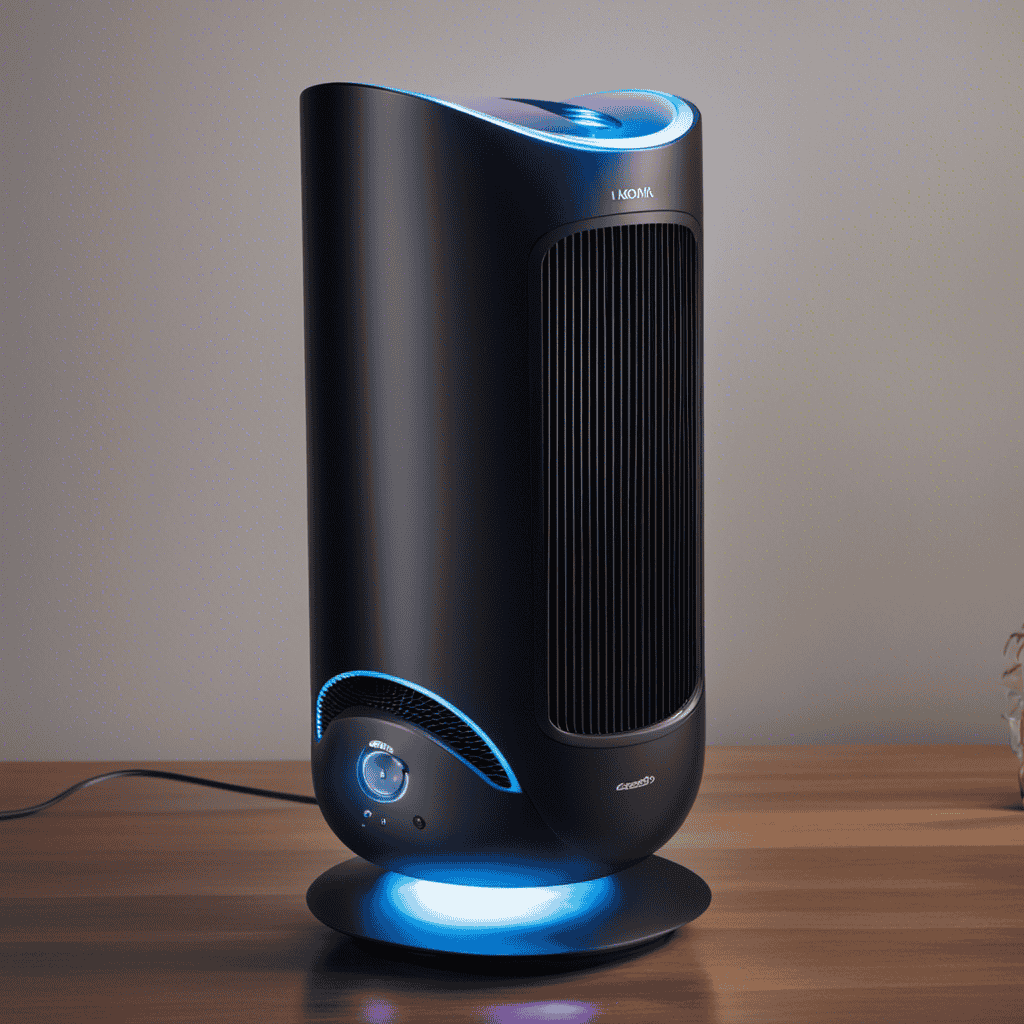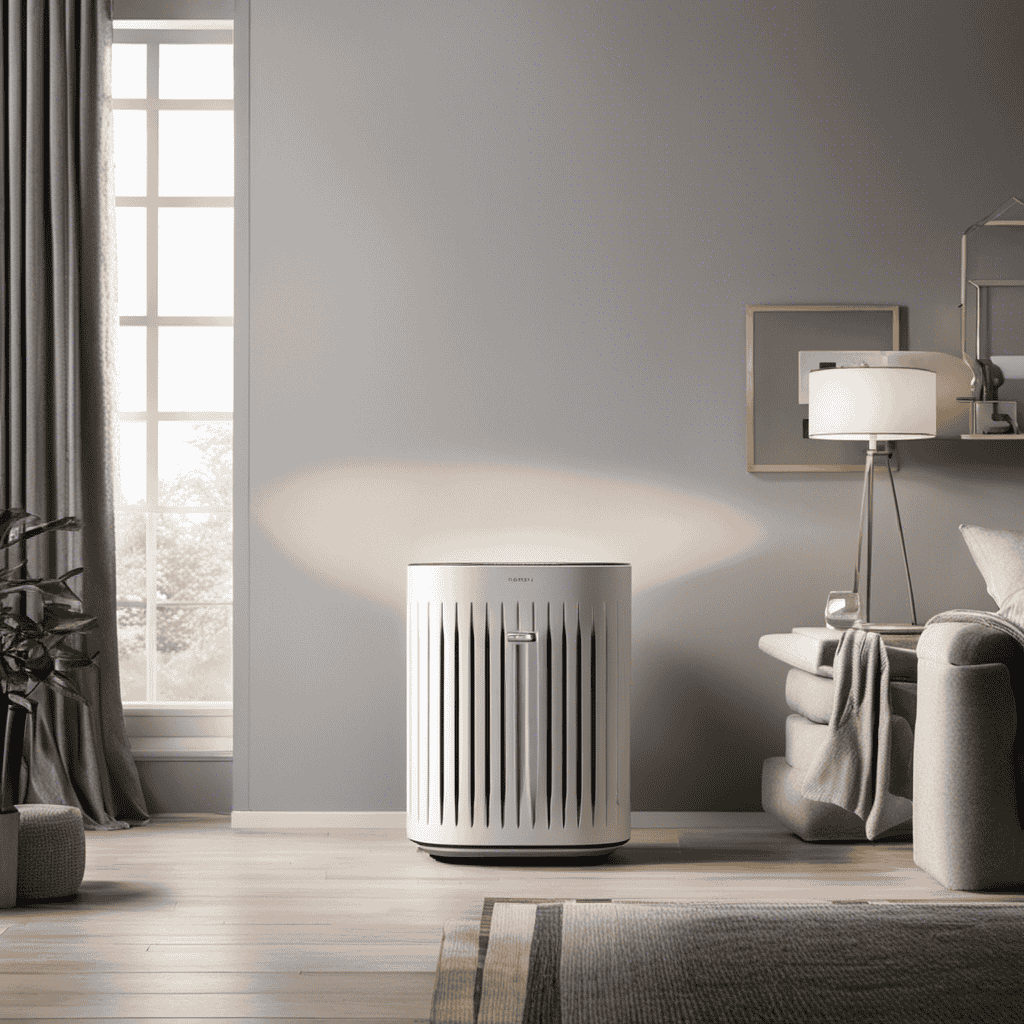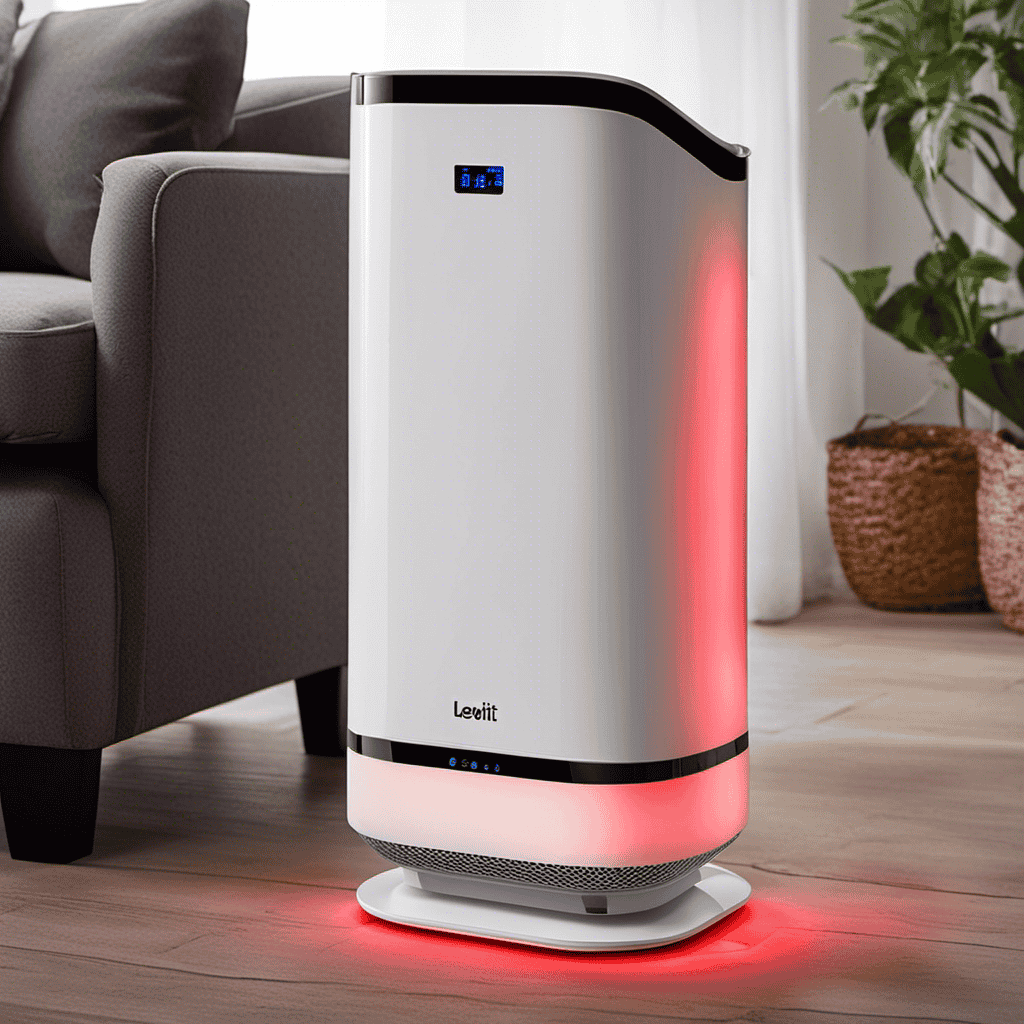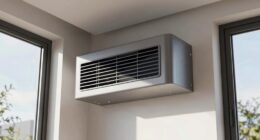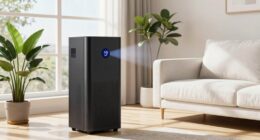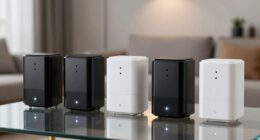As someone who values clean air, I am considering the potential disadvantages of ionizing air purifiers. While these devices are praised for their ability to improve air quality, there could be unexpected downsides.
In this article, we shall delve into the disadvantages of these purifiers, exploring the health risks they pose, their negative impact on indoor air quality, and the potential harm they may inflict upon asthma and allergy sufferers.
Additionally, we shall examine the dangers of ozone generation and the accumulation of harmful particles in the environment. Furthermore, we shall discuss the impact of ionizing air purifiers on the respiratory system and their limitations in removing certain airborne contaminants.
Prepare to be enlightened on the darker side of these seemingly beneficial devices.
Key Takeaways
- Ionizing air purifiers emit harmful byproducts such as ozone and ultrafine particles.
- High levels of ozone exposure can lead to lung damage and respiratory irritation, especially for individuals with pre-existing respiratory conditions.
- The long-term effects of prolonged exposure to these byproducts are not well understood.
- Ionizing air purifiers are not very effective at removing pollutants from the air, particularly smaller particles like allergens and VOCs.
Health Risks Associated With Ionizing Air Purifiers
One of the main disadvantages of ionizing air purifiers is that they can pose health risks. These devices work by emitting ions into the air, which attach to particles and cause them to fall to the ground or stick to surfaces. However, the process of ionization can also produce harmful byproducts, such as ozone and ultrafine particles.
Exposure to high levels of ozone can lead to lung damage and respiratory irritation, especially in individuals with pre-existing respiratory conditions like asthma or chronic obstructive pulmonary disease (COPD). Additionally, the long-term effects of prolonged exposure to these byproducts are not well understood, and further research is needed to fully understand the potential risks.
As we delve deeper into the discussion of ionizing air purifiers, it is crucial to consider their negative effects on indoor air quality.
Negative Effects on Indoor Air Quality
To maintain good indoor air quality, it is important to be aware of the negative effects caused by using an ionizing air purifier. Here are some important points to consider:
- Ionizing air purifiers release charged particles into the air, which can have a negative impact on lung function.
- These charged particles can irritate the respiratory system and worsen existing respiratory conditions.
Contrary to popular belief, ionizing air purifiers are not very effective at removing pollutants from the air. They may only remove larger particles, while smaller particles like allergens and VOCs remain in the air. Additionally, the ozone generated by ionizing air purifiers can also be harmful to your health.
Considering these factors, it is crucial to understand the potential harm that ionizing air purifiers can cause, especially for asthma and allergy sufferers.
Potential Harm to Asthma and Allergy Sufferers
As an expert in indoor air quality, I want to discuss the potential health risks for individuals with sensitivities and how ionizing air purifiers can aggravate respiratory conditions.
It is important to note that ionizing air purifiers produce harmful ozone gas, which can trigger asthma attacks and worsen allergies.
The release of ozone into the air can also lead to long-term respiratory problems, making it crucial for asthma and allergy sufferers to avoid using ionizing air purifiers.
Health Risks for Sensitivities
If you have sensitivities, be aware that using an ionizing air purifier may pose health risks. While these devices are designed to remove pollutants from the air, they work by emitting negatively charged ions that attach to particles, causing them to fall out of the air and onto surfaces.
However, this process can generate harmful byproducts, such as ozone and ultrafine particles, which can trigger sensitivity reactions and allergic symptoms.
Here are some key points to consider:
- Sensitivity triggers: Ionizing air purifiers can release ozone, a known respiratory irritant that can worsen asthma symptoms and cause lung inflammation.
- Allergic reactions: Ultrafine particles produced by ionizers can penetrate deep into the respiratory system and trigger allergic reactions in sensitive individuals.
- Asthma exacerbation: The ozone emitted by ionizers can exacerbate asthma symptoms, leading to increased coughing, wheezing, and difficulty breathing.
- Respiratory irritation: Some people may experience throat irritation, chest tightness, and coughing when exposed to elevated levels of ozone or ultrafine particles.
- Long-term health effects: Prolonged exposure to ozone and ultrafine particles may increase the risk of developing respiratory diseases and other health conditions.
It is important to carefully consider the potential health risks before using an ionizing air purifier, especially if you have sensitivities or are prone to allergic reactions.
Aggravation of Respiratory Conditions
Using an ionizing air purifier may worsen respiratory conditions, as it can release irritants like ozone and ultrafine particles. These irritants can cause respiratory irritation and lung inflammation, leading to discomfort and potential health risks.
Ozone, a byproduct of ionization, can irritate the respiratory system and worsen symptoms for individuals with asthma or other respiratory sensitivities. Additionally, ultrafine particles released by ionizing air purifiers can penetrate deep into the lungs and trigger inflammation, potentially exacerbating existing respiratory conditions.
It is important to note that not all ionizing air purifiers are created equal, and some may have higher emissions of ozone and ultrafine particles than others. Therefore, it is crucial to carefully research and select an air purifier that minimizes the release of these irritants to protect respiratory health.
Ozone Generation and Its Dangers
You should be aware of the dangers of ozone generation when using an ionizing air purifier. Ozone, a harmful gas, is produced as a byproduct of ionization in these devices. Here are five important points to consider:
- Ozone exposure: Ionizing air purifiers release ozone into the air, which can be harmful when inhaled in high concentrations.
- Respiratory irritation: Ozone can irritate the respiratory system, causing coughing, wheezing, and shortness of breath.
- Lung damage: Prolonged exposure to ozone generated by ionizing air purifiers can lead to lung inflammation and damage.
- Increased air pollution: Ozone generated by these purifiers can contribute to overall air pollution, especially in poorly ventilated spaces.
- Health risks: Ozone exposure has been linked to various health issues, including asthma attacks, allergies, and respiratory infections.
It’s important to understand the potential dangers associated with ozone generation when using ionizing air purifiers to make informed decisions about air purification in your home or workplace.
Accumulation of Harmful Particles in the Environment
As an expert in environmental health, I’m deeply concerned about the health risks associated with the accumulation of harmful particles in the environment.
These particles, such as fine particulate matter (PM2.5) and volatile organic compounds (VOCs), can have detrimental effects on our respiratory system, cardiovascular health, and overall well-being.
Furthermore, the presence of these particles in the air we breathe contributes to environmental pollution, which has far-reaching consequences for both human health and the ecosystem.
Health Risks of Particles
If you’re considering an ionizing air purifier, be aware of the potential health risks associated with the particles it releases into the air. Ionizing air purifiers work by emitting negatively charged ions that attach to airborne particles, causing them to drop to the ground or stick to surfaces. While this process helps to remove particles from the air, it can also introduce potentially harmful substances into your environment.
Here are some health risks to consider:
- Increased levels of ozone can cause respiratory issues and worsen asthma symptoms.
- The release of ultrafine particles, which can penetrate deep into the lungs, may contribute to respiratory problems.
- Ionizing air purifiers can produce negative ions that may react with other substances in the air, forming harmful byproducts.
- Some studies have suggested that ionizing air purifiers may generate small amounts of formaldehyde, a known carcinogen.
- Excessive exposure to ionizing radiation emitted by certain purifiers can have long-term health effects.
It’s crucial to weigh these potential health risks against the benefits of improved indoor air quality when deciding on an air purifier for your home.
Environmental Pollution Concerns
The release of harmful substances into the air may be a concern when considering an ionizing air purifier. While these purifiers are effective at removing particles and pollutants from indoor air, they also produce ozone as a byproduct of their operation.
Ozone is a harmful gas that can cause respiratory irritation and exacerbate existing respiratory conditions. In addition, ionizing air purifiers can generate byproducts such as formaldehyde and other volatile organic compounds (VOCs), which can contribute to indoor air pollution. These substances can have a negative environmental impact and may be harmful to human health when inhaled.
Therefore, it is important to carefully consider the potential environmental pollution concerns associated with using an ionizing air purifier.
Transitioning to the next section, let’s explore the impact of these purifiers on the respiratory system.
Impact on Respiratory System
You should be aware that ionizing air purifiers can potentially worsen your respiratory symptoms. These devices, which use an electrical charge to remove particles from the air, may seem like a good solution for improving indoor air quality. However, they can have negative effects on your lung health in the long term.
Here are some key points to consider:
- Increased production of ozone: Ionizing air purifiers can release ozone, a harmful gas, as a byproduct of their operation.
- Irritation of the respiratory system: Exposure to ozone can cause irritation and inflammation in the lungs, leading to respiratory symptoms such as coughing, wheezing, and shortness of breath.
- Aggravation of existing respiratory conditions: Individuals with asthma, allergies, or other respiratory conditions may experience a worsening of their symptoms when using ionizing air purifiers.
- Potential lung damage: Prolonged exposure to ozone and other harmful byproducts of ionizing air purifiers may lead to irreversible lung damage over time.
- Overall impact on lung health: It is important to carefully consider the potential long-term respiratory effects before using ionizing air purifiers, especially for individuals with pre-existing respiratory conditions.
Limitations in Removing Certain Airborne Contaminants
When it comes to removing certain airborne contaminants, it’s important to be aware that not all air purifiers are equally effective. One of the limitations in filtration that ionizing air purifiers have is their inability to effectively remove larger particles from the air.
While these purifiers are effective in removing smaller particles, such as dust and allergens, they struggle with larger particles like pet dander and pollen. This is because ionizing air purifiers work by charging particles, causing them to stick to surfaces or each other, rather than being filtered out of the air.
Additionally, ionizing air purifiers can produce ozone as a byproduct, which can be harmful to those with respiratory issues. It’s important to consider these limitations when choosing an air purifier to ensure the best air quality in your home.
Frequently Asked Questions
Can an Ionizing Air Purifier Cause Any Long-Term Health Effects?
Yes, ionizing air purifiers can cause long-term health effects. These purifiers release ions into the air, which can react with other particles and create harmful byproducts. These byproducts, such as ozone, can irritate the respiratory system and worsen existing respiratory conditions.
Are There Any Specific Groups of People Who Should Avoid Using Ionizing Air Purifiers?
There are specific health risks and potential side effects associated with ionizing air purifiers. Some groups, such as individuals with respiratory conditions or compromised immune systems, should avoid using them to minimize potential harm.
How Does Ozone Generation in Ionizing Air Purifiers Affect the Environment?
Ozone generation in ionizing air purifiers can negatively impact the environment. It can lead to the formation of smog and contribute to air pollution. This can have detrimental effects on indoor air quality and ozone regulation.
Can Ionizing Air Purifiers Effectively Remove All Types of Airborne Contaminants?
Ionizing air purifiers are effective against certain airborne contaminants like dust and pollen, but may not be as effective against volatile organic compounds (VOCs) or bacteria. Compared to other purifiers, they may have limitations in removing certain types of pollutants.
Are There Any Alternative Air Purification Methods That Are Safer and Equally Effective as Ionizing Air Purifiers?
There are alternative air purification methods that are safer and equally effective as ionizing air purifiers. However, it is important to consider the disadvantages of ionizing air purifiers in order to make an informed decision.
Conclusion
In conclusion, the disadvantages of ionizing air purifiers are nothing short of catastrophic. These devices not only pose a serious threat to our health, but they also worsen the air quality in our homes.
Asthma and allergy sufferers are particularly at risk, as these purifiers can exacerbate their symptoms. Furthermore, the ozone generation from these machines can have severe consequences on our respiratory system.
With the accumulation of harmful particles in the environment, it is clear that ionizing air purifiers are a menace that should be avoided at all costs.
